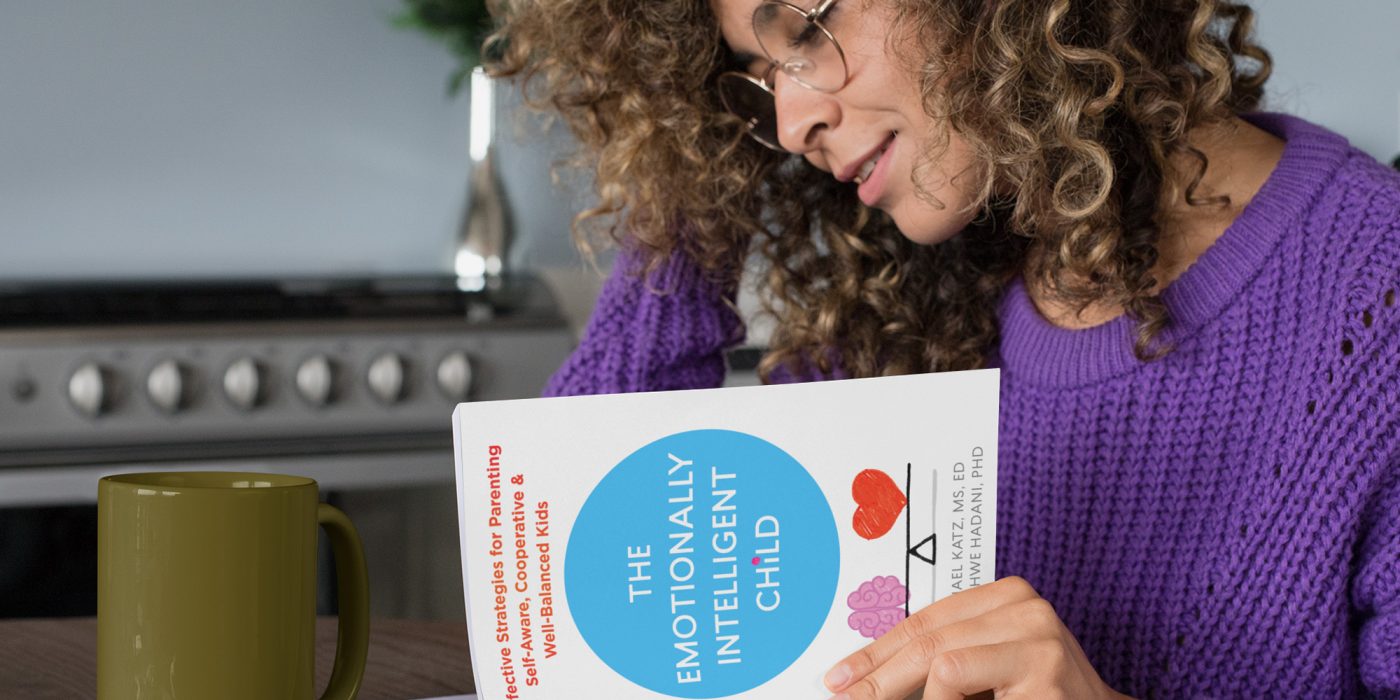Rachael Katz and Helen Shwe Hadani
The Emotionally Intelligent Child: Effective Strategies for Parenting Self-Aware, Cooperative, and Well-Balanced Kids
Oakland, CA: New Harbinger Publications, 232 pp.
Rachael Katz (MS Ed.) and Helen Shwe Hadani (Ph.D.) are excellent companions for mothers, fathers and caregivers of young children. Their views on parenting derive from their own families, as well as extensive reading into the science of brain development. They provide well-researched but thoroughly accessible tips and insights for “seeing your child’s actions through the lens of their development, and pausing to respond to their needs intentionally versus impulsively.” That pause is one of the hardest habits to cultivate, but it can make a world of difference.
Katz (former head of the Discovery School at the Bay Area Discovery Museum) and Hadani (a Brookings Institution Fellow) are encouraging and forgiving coaches, telling readers, “Guiding your child’s development requires an endless amount of patience and kindness, especially toward yourself. But it also requires knowledge about how children develop to understand what shapes their thoughts, behaviors and actions.”
Consider their perspectives on sharing, lying and remembering emotions.
We all agree that sharing makes for a harmonious playground and a more peaceful world, and we fully expect our offspring to let their friends take a turn with the Barbie—but then we hear they’re refusing to let anyone near the doll. Where did we go wrong? “Sharing involves the ability to take another’s perspective,” the authors remind confused, frustrated parents. Their developing minds have caught onto the intoxicating concept of ownership, and now they’re expected to willingly surrender property without a struggle? Putting ourselves in our kids’ tiny shoes will help them get better at this essential skill.
“Did you brush your teeth?”
“Yes.”
“Really?”
“Yes!”
“Really really?”
“Oops, I think I forgot something in the bathroom.”
Of course, lying is a behavior we want to discourage in children, but Katz and Hadani point out that deception actually demonstrates a leap forward in brain development, requiring “an understanding that other people have different beliefs and that those beliefs may not reflect reality.” This discovery sets their little minds on fire, so it’s natural that they’d want to try it out a couple of times.
By around age 5, the authors say, children are capable of re-experiencing emotions from a memory. Not only can they summon feelings of jealousy around actions that took place a few days ago, but they also learn to hide those feelings—whether to manipulate others or to fit in socially. Calling attention to these newly acquired strategies can lead to uncomfortable conversations and even conflict, but Katz and Hadani encourage parents to “explicitly teach your child about the developmental phase they are in, model it and offer suggestions for how to enhance it in a fun and playful way.” As the authors emphasize, timing is everything. It may not be productive to lecture them about brain development at the moment you catch your toddler in a lie or an act of aggression, but fascinating and helpful dialogues can take place later, during bath time.
Through words, pictures and stories, the authors maintain, children and their adults gradually gain fuller and more nuanced views of the world around them and between their ears. Parenting involves intentional and incidental steps to foster the vocabulary to recognize and name emotions, to picture them and render them on the page, and to understand and dream up stories where emotions show up and affects the chain of events.
Nobody said parenting would be easy. It demands patience, a sense of humor and self-awareness. The hardest parts are allowing ourselves to be vulnerable (“Children love to learn that their parents have struggles similar to their own”) and admitting that children and adults alike have the potential to be selfish jerks sometimes.
On the long and ever-expanding shelf of parenting books, The Emotionally Intelligent Child deserves a prominent spot alongside Adele Faber and Elaine Mazlish’s How to Talk So Kids Will Listen & Listen So Kids Talk (2012) and Thomas Lickona’s How to Raise Kind Kids (2018). Katz and Hadani join these authors in the conviction that becoming empathetic parents and caregivers is the key to bringing up the humans we want running our world in the future. Stories and infographics make it a book for sharing, perhaps with a trusted group of parents going through the same challenges as you.
It’s Time to Put Our Mindfulness HAT On
- H is for “happening”: Lets play attention to what is happening inside of us while we are sitting still. Notice sensations in your body—for instance, a tingle from excitement or a tightness from anger.
- A is for “allow”: While we sit, allow whatever is happening to just happen. Sit quietly and accept how you are feeling right now. Accept and allow the wave of excitement to pass through you if you are thinking about ice cream, for example.
- T is for “time”: Give yourself quiet time to notice your thoughts and feelings come and go without reacting to them. Pay attention to what you say to yourself. Do your words make you feel a certain way? Notice whether you’re kind or unkind to yourself.
—From The Emotionally Intelligent Child

Mark Swartz
Mark Swartz writes about efforts to improve early care and education as well as developments in the U.S. care economy. He lives in Maryland.



